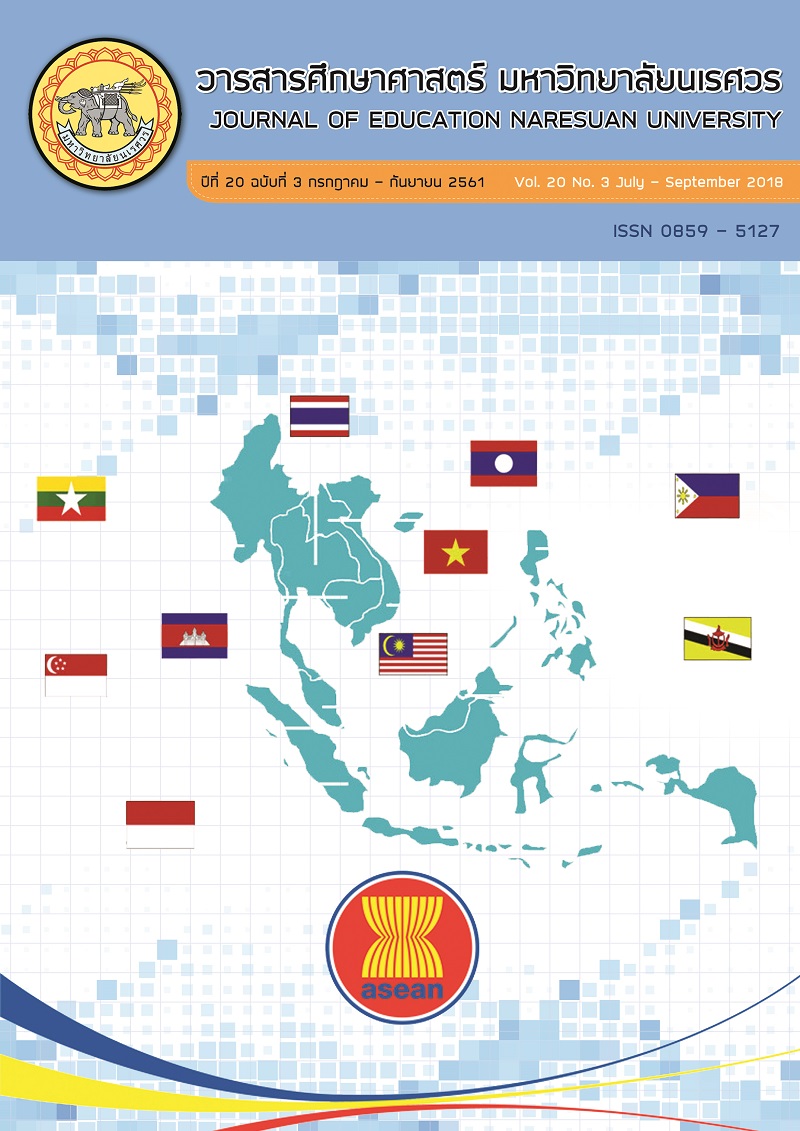รูปแบบการพัฒนาบทบาทครูพี่เลี้ยงในการส่งเสริมความสามารถด้านการจัดการเรียนรู้ของนักศึกษาฝึกประสบการณ์วิชาชีพครู; A MODEL FOR DEVELOPING THE MENTOR TEACHERS’ ROLES IN PROMOTING THE STUDENT TEACHERS’ LEARNING MANAGEMENT ABILITIES
Main Article Content
Abstract
การวิจัยนี้มีวัตถุประสงค์เพื่อสร้างและศึกษาผลการใช้รูปแบบการพัฒนาบทบาทครูพี่เลี้ยงในการส่งเสริมความสามารถด้านการจัดการเรียนรู้ของนักศึกษาฝึกประสบการณ์วิชาชีพครู กลุ่มตัวอย่างแบ่งเป็น 2 กลุ่ม คือ 1) กลุ่มศึกษาข้อมูลเพื่อสร้างรูปแบบเป็นครูพี่เลี้ยงและนักศึกษาฝึกประสบการณ์วิชาชีพครู จำนวน 640 คน ได้มาโดยการสุ่มแบบ 2 ขั้นตอน 2) กลุ่มทดลองใช้รูปแบบเป็นครูพี่เลี้ยงจำนวน 6 คน และนักศึกษาฝึกประสบการณ์วิชาชีพครู จำนวน 6 คน รวมจำนวน 12 คน จากสถานศึกษาเอกชน 2 แห่ง และรัฐบาล 2 แห่ง ผลการศึกษา พบว่า รูปแบบการพัฒนาบทบาทครูพี่เลี้ยง ประกอบด้วย 3 องค์ประกอบ คือ องค์ประกอบที่ 1 หลักการพัฒนา มี 3 ส่วน คือ แนวคิดทฤษฎี จุดมุ่งหมาย และเงื่อนไขของการพัฒนา องค์ประกอบที่ 2 กระบวนการพัฒนา มี 4 ขั้นตอน คือ เตรียมความพร้อม น้อมสู่การปฏิบัติ จัดกิจกรรมแลกเปลี่ยนเรียนรู้ ติดตามดูด้วยการประเมิน องค์ประกอบที่ 3 การติดตามประเมินผล ผลการประเมินรูปแบบการพัฒนา พบว่า มีคุณภาพด้านความเป็นไปได้ ความเหมาะสม ความถูกต้องและความเป็นประโยชน์ในระดับมากที่สุด มีความครอบคลุมในระดับมาก ผลการใช้รูปแบบการพัฒนาครูพี่เลี้ยง พบว่า ครูพี่เลี้ยงทุกคนมีพฤติกรรมการแสดงบทบาทในการส่งเสริมความสามารถด้านการจัดการเรียนรู้ของนักศึกษาฝึกประสบการณ์วิชาชีพครูโดยรวมอยู่ในระดับดีมากขึ้นไป นักศึกษาฝึกประสบการณ์วิชาชีพครูทุกคนมีพฤติกรรมการจัดการเรียนรู้โดยรวมอยู่ในระดับมากขึ้นไป
A MODEL FOR DEVELOPING THE MENTOR TEACHERS’ ROLES IN PROMOTING THE STUDENT TEACHERS’ LEARNING MANAGEMENT ABILITIES
The research objectives were 1) to create a model for developing the mentor teachers’ roles in promoting the student teachers’ learning management abilities, and 2) to study the effect of a model for developing the mentor teachers’ roles in promoting the student teachers’ learning management abilities. The subjects were divided into 2 groups. The group used to create a model was 640 of mentors and student teachers with two stage random sampling. The group used to study the effect of a model was 6 mentor teachers from 2 private school and 2 public school. The research result were as follows: The model included three components
1) the development principles which include theories, objectives, conditions, 2) the development process which include preparation, implementation, sharing, and 3) the development evaluation which found that the model had the quality on its feasibility, appropriateness, validity, usefulness at the highest level and comprehensiveness at high level. The role of all mentor teachers were at the highest level, and the learning management abilities of all student teachers were at the high level.
Article Details
The owner of the article does not copy or violate any of its copyright. If any copyright infringement occurs or prosecution, in any case, the Editorial Board is not involved in all the rights to the owner of the article to be performed.
References
Bowornritthideijh, P. (2008). Participatory research and development for school preparation to serve the practical teaching of student teachers (5-year-curriculum). Bangkok: Chandrakasem Rajabhat University. (in Thai)
Buosonte, R. (2012). Direction and area of evaluation (3rd ed.). Nakorn Sawan: Rimpingkarnpim. (in Thai)
Chaichaowarat, R. (2015). Way of teacher training for student: Professional learning community. Bangkok: Office for promotion of the learning society and the quality of youth. (in Thai)
Chumjit, Y. (2007). Self-actualization for teachers (4th ed.). Bangkok: O.S. Printing House. (in Thai)
Erawan, P. (2011). A path analysis for factors affecting pre-service teachers’ teaching efficacy. American Journal of Scientific Research, 13, 47-58.
Junghan, S. (2010). A training Curriculum development for mentor of students participating in practical on professional experience (Doctoral dissertation). Bangkok: King Mongkut’s University of Technology North Bangkok. (in Thai)
Jaruariyanon, W. (2014). The model for management of teacher professional experience training to develop the modern teachers’ quality. Journal of Education Studies, 42(2), 104-116. (in Thai)
Mongkhonvanit, J. (2012). Administration of education organization and personnel. Bangkok: Chulalongkorn University Press. (in Thai)
Nonhuaro, M. (2014). The development of an empowerment evaluation model for enhancing the educational assessment competency of inservice teachers in Prachinburi primary educational service area office2 (Doctoral dissertation). Bangkok: Srinakharinwirot University). (in Thai)
Nopparak, S., Panitplinchai, T., Wattanatorn, A., and Panawong, Ch. (2014). School-based development model for teachers and administrators in small-sized schools: a case of Phitsanulok Province. Journal of Education Naresuan University, 16(4), 141-154. (in Thai)
Sangmeesuk, S., Wannasri, J., Chansila, W., and Meejang, S. (2014). A model for competency development of teacher in school under the Jurisdiction of Primary Educational Service Area Office. Journal of Education Naresuan University, 16(2), 119-128. (in Thai)
Srisuk, K. (2009). Research methodology (3rd ed.). Chiangmai: Krongchangprinting. (in Thai)
Senjaiphrom, S. (2012). The conditions and problems of pre-service teacher training in Chiang Mai Rajabhat University. Chiangmai: Chiang Mai Rajabhat University. (in Thai)
Taylor, B., & Kroth, M. (2009). Andragogy’s transition into the future: Meta-analysis of andragogy and its search for a measurable instrument. Mountain Plains Adult Education Association Journal of Adult Education, 38(1), 5-7.
Thienngam, S., & Khajornsin, B. (2013). Factors affecting the teacher’s desirable characteristics of pre-service teacher at Rajabhat University: A multilevel structural Equation model analysis. Silpakorn Education Research journal, 5(1), 212-225. (in Thai)
Wongpracharat, C. (2013). The model of educational supervision by the external panel in basic education school board (Doctoral dissertation). Bangkok: Srinakharinwirot University. (in Thai)


